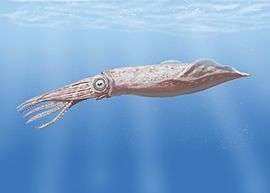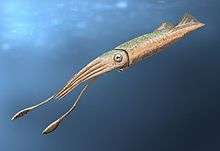Tusoteuthis
| Tusoteuthis Temporal range: Cretaceous | |
|---|---|
 | |
| Scientific classification | |
| Kingdom: | Animalia |
| Phylum: | Mollusca |
| Class: | Cephalopoda |
| Subclass: | Coleoidea |
| Order: | Vampyromorphida |
| Suborder: | Mesoteuthina |
| Family: | Kelaenidae |
| Genus: | Tusoteuthis Logan, 1898 |
| Species: | T. longa |
| Binomial name | |
| Tusoteuthis longa Logan, 1898 | |
Tusoteuthis is a genus of Cretaceous cephalopod molluscs. One species, T. longa, has been identified so far, and examination of gladius remains has yielded an estimated mantle length close to or equal to that of the modern giant squid. Recent studies suggest a closer relationship to the vampire squid than the modern day giant squid.[1]

Tusoteuthis is assumed to have preyed on other cephalopods, fish, and possibly even small marine reptiles.[2] Despite its size, which was around 20 to 35 feet (6 to 11 metres) long with tentacles fully outstretched, Tusoteuthis was still preyed on by other animals, especially the many, various predatory fish of the Western Interior Seaway. A fossil of the predatory aulopiform, Cimolichthys nepaholica, was found with the gladius of T. longa in its gullet. The back portion of the gladius was in the stomach region, while the mouth of C. nepaholica had remained opened, suggesting that the fish had died in the middle of swallowing the squid, tail first. Researchers strongly suspect that as the fish was swallowing Tusoteuthis, the head and/or tentacles remained outside the mouth, thus blocking the gills of the fish, and suffocating it as it swallowed its prey.[3]
See also
References
- ↑ Eyden, Phil (January 2006). "Tusoteuthis and the Cretaceous Giant Squids". Tonmo.com. Retrieved 16 April 2013.
- ↑ Everhart, Mike (2007). Sea Monsters: Prehistoric Creatures of the Deep. Washington, D.C.: National Geographic. p. 92. ISBN 1426200854.
- ↑ Kauffman, E. G. (1990). "Cretaceous fish predation on a large squid". In Boucot, A. J. Evolutionary Paleobiology and Coevolution. Amsterdam: Elsevier. pp. 195–196.
External links
- Image of fossil Cimolichthys with swallowed T. longa gladius at Oceans of Kansas Paleontology website
- Tusoteuthis longa at National Geographic website